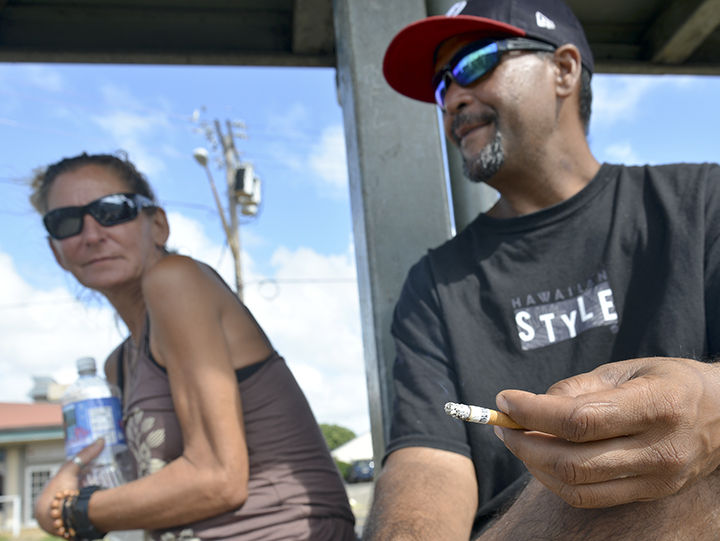Thank you for not smoking


In early 2010, Karen Latzka knew something was wrong. She was experiencing more pain in her joints and losing weight. Then she developed a cough and started coughing up blood. A session with her doctor revealed the grim diagnosis: lung cancer.
“My first sleepless night was wondering how I was going to tell my husband and children,” Latzka said. “My stepdad was diagnosed with cancer six years prior and he died a month after his diagnosis. It was frightening to tell them I had the same disease that killed him.”
But Latzka was determined to survive. She underwent extensive treatment for 3A lung cancer, including chemotherapy and surgery to remove part of her lung, followed by more chemotherapy.
“I just didn’t want to leave my family,” Latzka said.
It’s been four years since Latzka has beaten the disease. She now acts as an advocate for others fighting lung cancer.
“The hardest part was just going through the treatment and not really having anyone around me showing me that you can survive lung cancer, “ she said. “For somebody who’s diagnosed with the disease, the first thing I would say is that they should know that they deserve treatment. There’s a stigma with lung cancer that they don’t deserve it because it’s a smoker’s disease.”
Lung cancer is the leading cause of cancer-related deaths in the United States, having claimed 577,499 lives in 2012. Treatments are costly, resulting in $12.1 billion of care costs in 2010.
Hawaii was ranked the No. 1 state in combating the high cost of lung cancer, according to a recently released study by wallethub.com.
The study focused on two dimensions: “Favorable Environment for Lung Cancer,” and “Lung Cancer Prevalence and Prevention,” while looking into 11 metrics significant to the two dimensions.
In those metrics, Hawaii ranked first in smoking bans, second in top-rated hospitals for cancer and sixth in price of cigarette packs.
It also ranked fourth in cigarette taxes, eighth in the death rate from lung cancer, third in percentage of smokers who attempted to quit, and 12th in estimates of new lung cancer cases per capita.
On the lower end of the scale, the Aloha State placed 25th in air quality.
According to the American Lung Association, the main culprit of lung cancer is smoking, which has resulted in 90 percent of lung cancer cases.
To combat smoking, the state has prohibited the activity in enclosed or partially enclosed areas open to the public including government buildings. Hawaii has also made the distribution of sample cigarettes illegal, along with promotional materials for cigarettes and tobaccos.
And at the beginning of 2014, government officials implemented laws that prohibit people from smoking at beaches, parks and fitness facilities.
“We’re very proud of them,” said Lila Johnson, manager for Tobacco Prevention and Education Program at the Kauai State Department of Health, when asked her opinion on Hawaii’s anti-smoking laws.
Despite the state’s efforts — and the study’s national ranking — some on Kauai say the best weapon against the disease is to not smoke, which comes down to personal responsibility.
“Honestly, I smoke because I’m stupid,” said Darrin Kiyotsuka, who has been smoking for 30 years. “I started when I was 15 years old … back in the day it was a peer pressure thing, and it continued on from there.”
A Kauai resident since 1987, Kiyotsuka believes hospitals and governments are doing all they can to help stop lung cancer. He said it’s up to each person to decide to not smoke.
“It all boils down to an individual’s choice,” said Kiyotsuka. “Nicotine is a very addictive substance and a big part of it is that in order to deal with addiction you need to change your habits. You can offer all these programs but, if or when you become serious enough to stop, you can kick the habit, and I hope one day I will, too.”
Another advocate in the fight against cigarettes is Bev Brody, director of nutrition and physical activity of the coalition “Get Fit Kauai.”
“I think that our tobacco free coalition is doing an outstanding job trying to implement laws that discourage smoking,” said Brody. “I’m not surprised we’re No. 1 in banning smoking. It also shows that we have support from the Legislature in this ban, so it shows me that they support healthy living as well.”
To earn the fourth-place rank in cigarette taxes, Hawaii charges $3.20 in taxes per pack, according to The Federation of Tax Administrators. That means residents here are paying around $10 for a pack of cigarettes, which earned them the sixth-place ranking in cost.
A former smoker, Latzka understands the road to recovery is difficult. She also knows that few people who are diagnosed with lung cancer survive.
“For people diagnosed with lung cancer, 50 percent of them will be dead in a year. The survival rate for lung cancer is 16 percent and that hasn’t changed in 40 years,” she said.
Latzka said early screening is a helpful preventive measure.
She pointed out that the U.S. Preventative Services Task Force recommended lung cancer screening by low dose computer tomography at the beginning of this year.
“If lung cancer is caught in the early stages, you have a possibility of a cure,” said Latzka. “It’s my responsibility to rally other survivors to lift up their voices as well, and to lift the stigma. … You can beat the odds. You are not a statistic.”
•••
Averie Soto, staff writer, can be reached at 245-0452 or asoto@thegardenisland.com.
